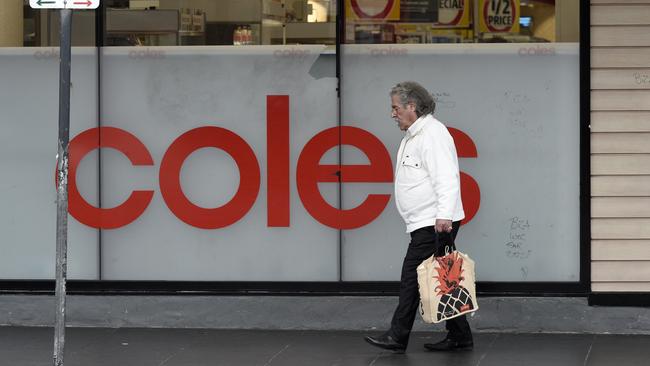Cheap wine and a half-filled tank as cost of living bites
The bosses of two of the nation’s leading retailers, Coles and 7-Eleven, are noticing shoppers switching to cheaper goods and using less petrol as savings dwindle and cost-of-living pressures grow.

Consumers under pressure from rising rents or mortgage repayments along with higher energy bills are finding new ways to economise, such as shifting to cheaper forms of alcohol or filling their cars with less petrol, the bosses of retail giants Coles and 7-Eleven have reported.
Painting a worsening picture of the state of the consumer, Coles chief executive Leah Weckert has revealed that sales of her “own brand” or private label groceries are growing at almost double the pace of mainline-branded groceries while 7-Eleven boss Angus McKay says drivers fill their tanks with less petrol as prices spike.
Ms Weckert revealed that a recent survey of her shoppers and their spending intentions showed about 30 per cent were planning to spend less on liquor as money left over from paying household bills shrinks. “We are definitely seeing more customers cutting back on liquor at the moment and that can be a range of things – that can be drinking less but it might also be trading down into a lower priced alternative.”
Mr McKay, whose chain is Australia’s largest fuel and convenience store operator, has also warned of possibly worse times ahead as the nation prepares for winter and households brace for a potential spike in heating bills that will further erode spending power.
This comes as many consumers are already buckling under the strain of a string of interest rate rises, rent hikes by landlords, and the cumulative cost-of-living pressures now draining their savings.
“Savings rates have started to decrease. Cost of living has gone up; yes, we all talk about interest rates … but it is the combination of things that has really hurt the consumer so it’s low relative real wage growth over a sustained period of time, higher interest rates, and it is absolutely utilities, which we don’t talk enough about which really hurts the consumer,” Mr McKay told a retail forum held by KPMG on Tuesday.
He said as petrol prices rose, often driven by a crisis in the Middle East as now, people try to stretch their household budgets by putting less petrol in the tank. “The higher the price, the less people buy,” he said.
“What we know is that people buy fuel on a budget, there are clearly people that just go in and fill it up, but equally a lot of people will put $20, $30, $40 in at a time.”
Ms Weckert said her supermarket chain’s portfolio of liquor stores – Liquorland, First Choice and Vintage Cellars – was witnessing shoppers trade down to cheaper brands or rein in their consumption to keep to discretionary spending budgets.
She said on Tuesday that customers were swapping from more expensive categories such as Champagne into more affordable sparkling beverages like prosecco, or switching to cheaper beers.
Price increases in some spirits like whiskey, vodka and gin had also pushed shoppers into cheaper pre-mixed drinks, known as RTDs.
“The flow-on effect from that is we are seeing … RTDs are now continuing to grow because customers are trading out of those full bottle of spirits into more affordable options, like RTDs,” she said.
For the Coles range of home brand or private label groceries, its sales rose a robust 8.8 per cent over the third quarter, against 5.1 per cent sales growth for overall supermarket sales.
“We definitely are seeing private labels grow and accelerate during this period of cost-of-living challenges,” Ms Weckert said.
Westpac senior economist Matthew Hassan said he had also witnessed this growing pessimism among consumers and Australian households in the face of years of ratcheting cost-of-living pressures, rents and mortgage interest rates.
He suggested that the Australian consumer was now “gloomy”, and seemingly more downbeat than shoppers elsewhere, with no bright light currently visible on the horizon.
“Pessimism has dominated for two years now, with any improvement still looking a long way off,” Mr Hassan said.
“Australia’s consumer gloom has lasted longer than most, reflecting a heavier impact from interest rate increases and tightening fiscal conditions.”




To join the conversation, please log in. Don't have an account? Register
Join the conversation, you are commenting as Logout